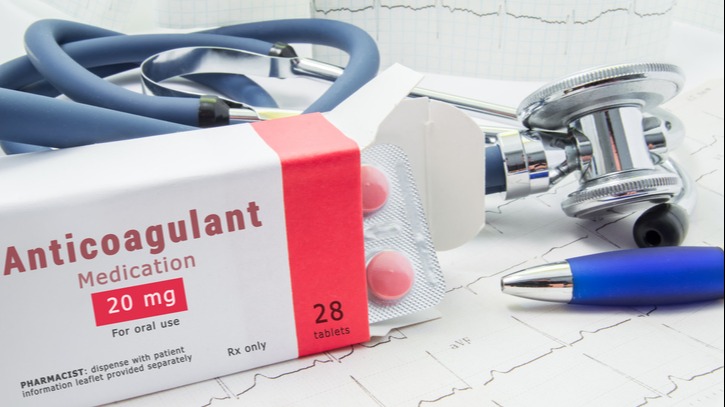
For individuals living with atrial fibrillation or deep vein thrombosis, the decision between anticoagulant medications can be critical, impacting their quality of life and health. Among the available options, two commonly prescribed anticoagulants are Eliquis (apixaban) and warfarin. Both medications prevent blood clots, yet they operate differently and carry advantages and disadvantages.
In this post, we compare Eliquis and warfarin, shedding light on their mechanisms of action, efficacy, safety profiles, dosing regimens, and practical considerations.
Understanding Eliquis
Eliquis works through its active ingredient, apixaban, a member of the direct oral anticoagulant (DOAC) class. Unlike traditional anticoagulants such as warfarin, which inhibit the synthesis of clotting factors in the liver, apixaban targets a specific component of the coagulation cascade: Factor Xa. Factor Xa plays a crucial role in converting prothrombin to thrombin, the enzyme responsible for the final step in blood clot formation. By selectively inhibiting Factor Xa, Eliquis disrupts this cascade, effectively preventing the formation of blood clots.
Eliquis's mechanism of action offers several advantages over traditional anticoagulants like warfarin. One notable benefit is its predictable pharmacokinetics, which prevents the need for routine monitoring of coagulation parameters. Eliquis has a rapid onset of action, achieving therapeutic anticoagulation within hours of administration. This rapid onset is particularly advantageous when immediate anticoagulation, such as treating acute thrombotic events, is warranted.
Moreover, Eliquis exhibits a favorable safety profile, with a lower risk of major bleeding events than warfarin. This reduced bleeding risk is attributed to its targeted inhibition of Factor Xa, which minimizes interference with other coagulation cascade components. As a result, Eliquis offers a compelling option for patients requiring long-term anticoagulation therapy, balancing the need for efficacy with a lower risk of bleeding complications.

Understanding Warfarin
Warfarin has been a mainstay in the management of thrombotic disorders for decades. Unlike Eliquis, warfarin belongs to the class of vitamin K antagonists. Its mechanism of action centers around interfering with the synthesis of vitamin K-dependent clotting factors in the liver, namely factors II, VII, IX, and X. By inhibiting the activity of vitamin K epoxide reductase, an enzyme critical for the recycling of vitamin K, warfarin effectively depletes the functional pool of vitamin K necessary for the carboxylation of these clotting factors. As a result, the production of biologically active clotting factors is impaired, leading to anticoagulation.
One of the distinguishing features of warfarin is its narrow therapeutic window, necessitating meticulous dose titration and regular monitoring of coagulation parameters such as the International Normalized Ratio (INR). The INR reflects the patient's prothrombin time ratio to that of a standardized control, indicating the patient's coagulation status. Achieving and maintaining the target INR range is crucial for balancing the risk of thrombosis and bleeding. Failure to maintain therapeutic levels of anticoagulation increases the risk of thrombotic events, while over-anticoagulation heightens the risk of bleeding complications. Consequently, patients on warfarin therapy require frequent INR monitoring, particularly during the initiation phase and when factors affecting warfarin metabolism change, such as concurrent medication use or dietary intake of vitamin K-rich foods.
Despite its efficacy in preventing thromboembolic events, warfarin poses several challenges compared with newer anticoagulants like Eliquis. Its slow onset of action, variable pharmacokinetics, and susceptibility to drug-drug interactions necessitate close monitoring and frequent dose adjustments, contributing to its reputation as a demanding medication to manage. Nevertheless, warfarin plays a vital role in anticoagulation therapy, especially in scenarios where its long-term safety and cost-effectiveness outweigh the advantages of newer alternatives.
Comparing Eliquis and Warfarin
Clinical trial data has consistently demonstrated the efficacy of both Eliquis (apixaban) and warfarin in preventing strokes among patients with AFib. Notably, the landmark ARISTOTLE trial compared Eliquis to warfarin in over 18,000 patients with AFib and at least one additional risk factor for stroke. The study found that Eliquis significantly reduced the risk of stroke or systemic embolism by 21% compared with warfarin, with a lower rate of major bleeding events. Aristotle and other clinical trials provide robust evidence supporting the effectiveness of Eliquis and warfarin in reducing the risk of stroke in individuals with AFib. The choice of either medication should be made in consultation with a qualified healthcare provider.
Safety Profile
One of the most significant differentiating factors between Eliquis and warfarin is their respective bleeding risks. Eliquis often demonstrates a favorable safety profile compared with warfarin, particularly regarding major bleeding events, including intracranial hemorrhage. The ARISTOTLE trial found that Eliquis was associated with a lower risk of major bleeding than warfarin. Eliquis reduced the risk of significant bleeding by approximately 31% compared with warfarin in patients with AFib. This substantial reduction in bleeding risk is particularly notable in the context of intracranial hemorrhage, a severe and potentially life-threatening complication of anticoagulant therapy.
In addition to reducing significant bleeding risk, Eliquis has demonstrated a specific advantage over warfarin regarding intracranial hemorrhage. Intracranial hemorrhage is of particular concern due to its high morbidity and mortality rates. Clinical trials, including ARISTOTLE, have consistently shown that Eliquis significantly lowers the risk of intracranial hemorrhage compared with warfarin. This reduced risk of intracranial bleeding with Eliquis is attributed to its more predictable pharmacokinetics, rapid onset of action, and targeted inhibition of Factor Xa, which collectively minimize interference with other coagulation cascade components and reduce the likelihood of bleeding complications.
Overall, the differences in bleeding risks between Eliquis and warfarin underscore the importance of considering safety outcomes alongside efficacy when choosing anticoagulation therapy, especially in patients with AFib or other thromboembolic disorders. Eliquis offers a compelling option for patients who require anticoagulation therapy, providing robust stroke prevention efficacy coupled with a lower risk of major bleeding events, including the critical outcome of intracranial hemorrhage. This favorable safety profile positions Eliquis as a preferred choice in many clinical scenarios, offering clinicians and patients confidence in balancing the risks and benefits of anticoagulant therapy.
Conclusion
If you or someone you know has AFib, I encourage you to discuss the options with a healthcare provider to determine the most suitable anticoagulant for their needs.
Rely on PlanetDrugsDirect.com to Buy Online Eliquis (Apixaban) for Sale
As a trusted prescription referral service, we offer important benefits whenever you order online. Each of our partner pharmacies and/or government-approved dispensaries is committed to providing the best experience possible of any online prescription referral service on the internet. We offer:
Low prices
Quick turn-around times
Generic and brand-name medications
Unparalleled customer service
 Medically reviewed by
Medically reviewed by 





